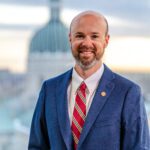One of the rules of modern discourse is to keep God, or religious-based argument, out of the arena of politics.
Because we’re a country conditioned by an ahistorical interpretation of Jefferson’s famous “Separation of Church and State” language, we’ve come to think and require our officials to sanitize their argument of anything smacking of religion.
Building off abuses of Jefferson’s rhetoric and combined with John Rawls’ public reason ethic that requires citizens to rid themselves of “comprehensive doctrines” when making public arguments, American political discourse is one that has come to rely on an unspoken and spoken expectation that there be a wedge in how a person’s religion informs their ethics and decision-making. One of the great blasphemy codes of American political life is the suspicion that someone is smuggling in religion for the cause of politics (we’ll leave aside for the moment a conversation on how this expectation itself is religious in nature).
But is this right? Should people of faith abandon their religion when it comes to politics? One quick answer is to sort out the procedural process of how one translates religiously-informed argument in a pluralistic setting, something I’m not intending to do in full right now. But to be sure, as a Christian, I do think it is incumbent for Christians to make publicly-accessible arguments that can be understood by people who do not share all of our presuppositions. Not every issue raised by Christians maps easily into the public square as others, so there is caution in how religiously-based arguments are to be made.
An obvious example of selective outrage
What I want to do, and briefly, is simply point out an obvious example of selective bias and selective outrage when it comes to the use of religion in public argument: Whoever controls the rhetorical guardrails of political discourse is more apt to allow whatever discourse is necessary to benefit their political preferences.
Who do I have in mind? The insurgent Democratic presidential candidate, Mayor Pete Buttigieg, the Episcopalian wunderkind of the progressive Left.
Along with his eloquence and obvious brilliance, Buttigieg is hailed as a figure long awaited by progressive faith communities. At a time when modern Democratic politics appears to be growing ever-more secular, in steps Mayor Buttigieg and his openness at speaking about his Episcopalian faith. The headlines and stories are too numerous to report on at this point. For examples, I’ll point you to Albert Mohler’s excellent essay on what Buttigieg’s candidacy has to say about the vision that progressive Christianity has for America.
But one thing is for sure: Mayor Buttigieg is comfortable marshaling his faith for the purpose of progressive politics.
In an interview with columnist Kirsten Powers at USA Today, Buttigieg is quoted saying: “The left is rightly committed to a separation of church and state . . . but we need to not be afraid to invoke arguments that are convincing on why Christian faith is going to point you in a progressive direction.”
This is a naked admission that his faith is a vehicle for a progressive causes; something, honestly, I do not hear from even the most conservative Christian politicians. But no one bats an eye at Buttigieg. Imagine if a conservative Christian candidate said the direct equivalent: “The Right is rightly committed to a separation of church and state . . . but we need to not be afraid to invoke arguments that are convincing on why Christian faith is going to point you in a conservative direction.” Of course, many of us are familiar with conservative abuses and misuses of religion for political ends—something that liberals and many conservative Christians are happy to criticize.
But notice the inconsistency in how outrage is channeled. If a conservative Christian references a Genesis account of creation for establishing a marital definition of male and female, immediately there are shouts of “theocracy, theocracy, theocracy!“
Further on in the interview with Powers, Buttigieg is comfortable using his Christian faith as a means to bring specific attention to the issues of immigration, criminal justice, and poverty. So, to be clear, Mayor Buttigieg is comfortable allowing his Christianity to run the gamut of issues in its application to politics.
But wait a second. I thought the use of religion for the sake of advancing political argument was verboten according to secular prohibitions. It’s important to notice a peculiar absence in the aftermath of Buttigieg’s remarks: There are no notable progressives calling Buttigieg out for deploying faith for the sake of progressives politics. No one on the Left is coming after Buttigieg for using religion when it comes to immigration or poverty. Why is that?
The expectation that people altogether sever their faith from their politics is a far cry from the American constitutional order of separating church and state.
One can only wonder why the silence is so deafening. Could it be that the insistence that religion be used as grounds for political argument is not applied consistently across the board? Could it be that progressives are comfortable touting the benefits of religion when it aligns with their predilections and political prerogatives? Or is it that secularism and public reason are not as epistemologically neutral as we’re told they are? Is it at all possible that barring God-talk from the public sector tilts the public sector in a secular direction, but done so using a set of rules that progressives themselves do not play by when its expedient and advantageous?
For the good, Buttigieg’s candidacy is a reminder that religion has an inevitable impact on the formation of one’s values. The expectation that people altogether sever their faith from their politics is a far cry from the American constitutional order of separating church and state.
For the ill, Buttigieg’s version of Christianity (especially on matters of gender, sexuality, and abortion) is incompatible with biblical Christianity. His Mainline Protestantism has long ago jettisoned anything resembling biblical and orthodox Christianity.
Evangelicals can be thankful that Buttigieg is refusing to play by progressivism’s rhetorical rules while at the same time ruling his interpretations and appropriation of the Christian faith as hermeneutically suspect and hollow.
Check out this article on Andrew’s site.










